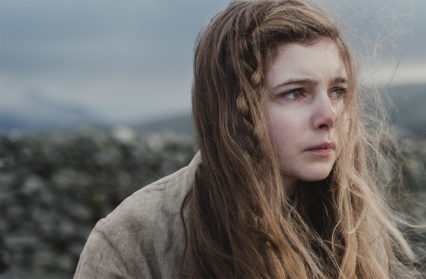Gary Raymond reviews Gwen, the debut feature from writer/director William McGregor starring Maxine Peake and Eleanor Worthington-Cox.
It’s grim ooop north. Words you can imagine Maxine Peake saying in her original Bolton brogue with a certain degree of ironic relish. After five weeks filming in the wild winds of Snowdonia for writer/director William McGregor’s debut feature Gwen, she may be saying it in her adopted Welsh accent too. For Gwen is grim. It is grim and it is bleak. Unrelentingly bleak. It is bleak in tone, in impetus, in pacing, visually, and narratively. Gwen forms part of Visit Wales’s landscape and culture themed season of films, and I’m confident will do as much for Welsh tourism as foot and mouth did for the Lake District.
But this is not to say Gwen is a bad film. Far from it. It is an accomplished piece of work, from a director who will grow in confidence and skill. Scene-for-scene, there is certainly little wrong with McGregor’s vision. But there is an unwillingness to allow in any chink of light, and ultimately the darkness wins out.
Gwen tells the story of the young titular character played by Eleanor Worthington-Cox in a controlled and compelling performance that is in turns tender and intense. We are in the slate lands of Snowdonia sometime during the era of the industrial revolution, and the slate quarry is slowly beginning to swallow up the local longstanding farmsteads, by hook or by crook. The overriding menace of the film is that more and more this is being done by crook. McGregor decides to stick tightly to Gwen’s point of view, and this works very well when trying to create a tense experience built of half-conversations and partial understandings of the machinations of the adult world. But it is also restrictive, and the menace of Richard Harrington (who seems so ubiquitous on Welsh screens of late I understand Eve Myles only narrowly edged him out in casting to reprise her role in the upcoming second season of Keeping Faith) and cane-swatting Mark Lewis Jones is undermined by their lack of third or even second dimensions.
Gwen also struggles with a story as thin as a strand of pipe tobacco, but in cinema history, plenty more substantial stories have been served with much less determination than William McGregor brings here. Where his direction falls short is in the creeping realisation that he could never really decide what Gwen was supposed to be. In the end, it’s neither a folk story, a parable, an historical drama, or a horror movie, and yet at different moments it purports to be each of those things.
But the strengths lie in the performances and that grim backdrop of the unforgiving wilds of Wales. McGregor’s script suffers ever-so-slightly from the anti-naturalist minimalism plaguing Welsh screenwriting at the moment that makes characters sound like they’ve been programmed by a Norman Collier-bot, where beginnings and endings of sentences are snipped away, clauses cast into the wind, but in Gwen more often than not, this actually contributes to the tone, to the thematic shadows. Also, there’s only about twenty five lines of dialogue in the film anyway, so it doesn’t matter so much.
Maxine Peake does the job she was hired for, and gives a weighty committed performance as Gwen’s mother, her shoulders and eyes becoming ever more sunken as each grim chapter drives the story to a somewhat inevitably depressing conclusion (no spoilers, but some warning!). McGregor has directed an episode of the hotly-anticipated new HBO/BBC adaptation of Phillip Pullman’s His Dark Materials, which is likely to be one of the television events of 2019 when it airs later this year, so he’s clearly no slouch. We’ll see much from him in future no doubt, and the chances are Gwen will eventually be a footnote in an impressive career. Because, the truth is, Gwen has much to recommend it, but it’s just not so easy to recommend.
Gary Raymond is a novelist, critic, editor and broadcaster.



 Enjoyed this article? Support our writers directly by buying them a coffee and clicking this link.
Enjoyed this article? Support our writers directly by buying them a coffee and clicking this link.








